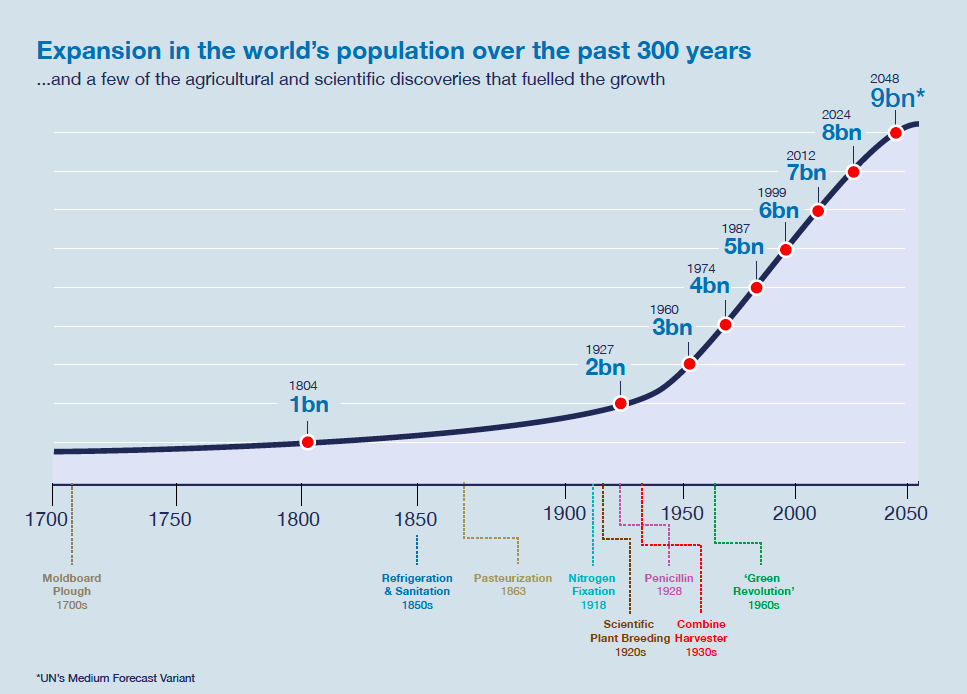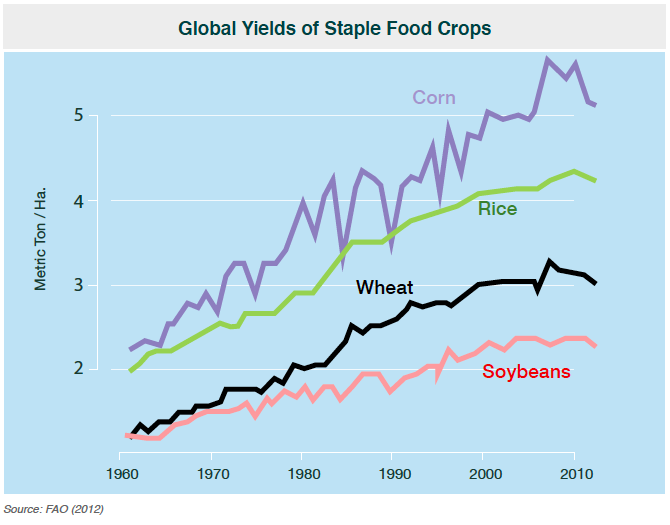“Man can and must prevent the tragedy of famine in the future instead of merely trying with pious regret to salvage the human wreckage of the famine, as he has so often done in the past.”
Norman Borlaug – Biologist, Humanitarian and Nobel Laureate
Ensuring a sustainable food supply has been mankind’s most significant challenge throughout history, one that has been compounded by the unprecedented increase in population over the last century.
With so few scientific breakthroughs to increase agricultural yields, the food needs of growing populations were originally met by simply utilizing more land for agriculture. By the 19th century, soon after human civilization reached its first billion people, pessimism regarding the possibility of feeding the ever-increasing populations began to surface. The task appeared even more daunting as advances in medicine and public health led to longer life expectancies and more children being born. Thomas Robert Malthus, one of the most prominent demographers and political economists of the time, predicted that the fast accelerating population growth would be too great a strain on humanity’s most vital resources and eventually lead to a global population stricken by famine and disease.
Since the prediction of this Malthusian catastrophe, the global population has expanded more than seven-fold to 7.3 billion in 2015. Our rising population is also ageing, with 15% of all humans who have ever existed and half of those who have reach the age of 65 currently alive today. Thankfully, Man’s resilience and ingenuity overcame Malthus’ predictions (at least until now) by what is known as the Green Revolution.
The Green Revolution of the 1960s was a turning point in modern agriculture that saw a drastic increase in global production through a series of research, development and technological innovations, saving one billion people from starvation. Although these developments enabled our rising population to thrive well into a new millennium, farming techniques now rely on an unsustainable amount of water, energy and synthetic agrochemicals, often with little regard to any long-term adverse affects to our environment and health.
Fast-forward to today and we are on the verge of a food crisis. Global food prices reached their all time peak in February 2011, and in 2013 the Food and Agriculture Organization (FAO) estimated that 870 million people suffered from ‘chronic undernourishment’. This is equivalent to one in every eight people on the planet. Although food production has so far kept up with population growth, agricultural yields are beginning to show a decline. Researchers from MIT, the University of Hong Kong and Colorado State University estimate that global crop yields of rice, wheat corn and soy will see a 10% decline 2050. Nearly two billion tons of food, between 30-40% of the world’s total, is also wasted before it reaches humans. Sometimes this is deliberate, because humans interfere with the supply chain in order to realign the demand-supply dynamic. In other situations, there is a breakdown in the link between the farmer, the distributor and the consumer. This is due to a lack of investment in infrastructure, or poor engineering and agricultural practices in developing regions of the world.
Innovation is necessary in global agriculture. Slowing levels of agricultural productivity and limited investment in infrastructure both need to be tackled. The UN’s FAO estimate that levels of investment in agriculture will have to rise 50% to meet the near term requirements for sustaining our global population.
Unless moves are made to explore sustainability, living within our means may mean having to make do with less. Farmland availability is shrinking, much of it to make way for the expanding urban populations. Crop yields are no longer expanding with the ‘Green Revolution’ of the 1960s and 1970s is now just a distant memory. Water resources are under pressure and soil quality continues to deteriorate. A new, kinder and more efficient way of producing food needs to be found if some of the worst aspects of Malthus’s predictions are to be avoided from occurring this century.
The Green Revolution is dead…. Long live the Green Revolution.

